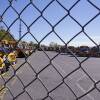Amid a Wednesday meeting disrupted by a small band of anti-vaccination protesters, the Boston City Council voted to consider transforming the city's mayor-appointed School Committee into a publicly elected body.
Boston voters overwhelmingly expressed their preference for an elected school board in a non-binding referendum in November.
More Politics
For the change to happen, it has to go through City Council, Mayor Michelle Wu, the Legislature and, finally, Gov. Charlie Baker. The council must first pass a home rule petition asking the state Legislature to endorse the change, and for that petition to make it to the Legislature, Wu must sign it.
Councilor Ricardo Arroyo, a strong proponent of reestablishing voter control of schools, recognized the potential for conflict. While some Councilors side with the voters, Mayor Michelle Wu favors what's known as a "hybrid" model made up of elected and appointed members.
Arroyo, when reintroducing the home rule petition in the Council, said, "I know that there are members on this Council who want a fully elected body, there's folks who want districts, there's folks who don't want districts, there's folks who do want some version of a hybrid. My goal is, in the next couple months, to hopefully have this go through working sessions and maybe another hearing to make sure that all those voices are heard."
The anti-vaccine protests were a baptism by fire for new Council President Ed Flynn, who tried to reason with the protesters by offering a private meeting at the close of Council business. When his effort failed, Flynn ordered the Councilors into virtual session as security escorted the group of objectors out of the chamber.
As of last Thursday, 86% of Massachusetts residents have received at least one dose of the COVID-19 vaccine, state data shows. Wu said Monday that 94% of city employees have gotten at least their first shot, ahead of a mandate for municipal workers that is set to go into effect after Jan. 30.








